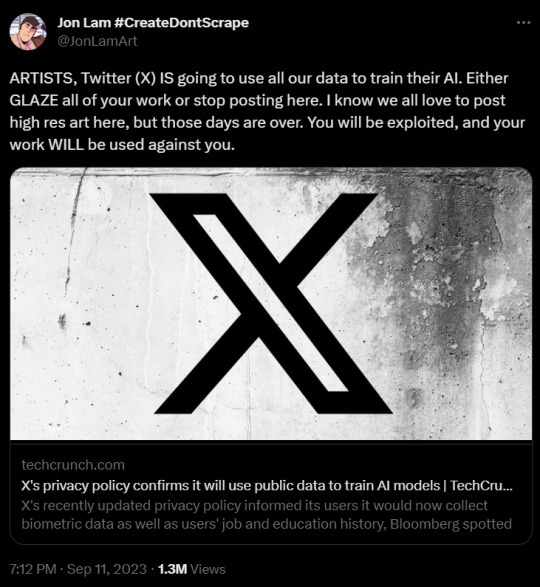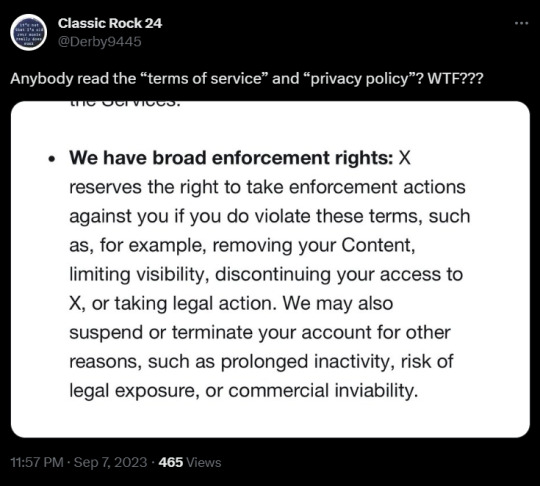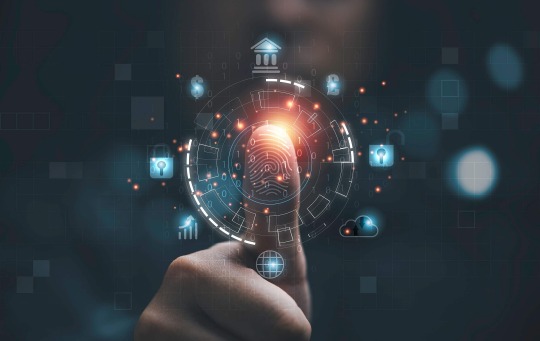#biometric privacy
Text

But as ever-larger, more concentrated corporations captured more of their regulators, we’ve essentially forgotten that there are domains of law other than copyright — that is, other than the kind of law that corporations use to enrich themselves.
Copyright has some uses in creative labor markets, but it’s no substitute for labor law. Likewise, copyright might be useful at the margins when it comes to protecting your biometric privacy, but it’s no substitute for privacy law.
When the AI companies say, “There’s no way to use copyright to fix AI’s facial recognition or labor abuses without causing a lot of collateral damage,” they’re not lying — but they’re also not being entirely truthful.
If they were being truthful, they’d say, “There’s no way to use copyright to fix AI’s facial recognition problems, that’s something we need a privacy law to fix.”
If they were being truthful, they’d say, “There’s no way to use copyright to fix AI’s labor abuse problems, that’s something we need labor laws to fix.
-How To Think About Scraping: In privacy and labor fights, copyright is a clumsy tool at best

Image:
syvwlch (modified)
https://commons.wikimedia.org/wiki/File:Print_Scraper_(5856642549).jpg
CC BY 2.0
https://creativecommons.org/licenses/by/2.0/deed.en
#scraping#privacy#labor#human rights#FARC#colombia#HRDAG#wayback machine#new york times#copyright#robots.txt#Mario Zechner#monopoly#price fixing#austria#clearview ai#biometrics#biometric privacy#plausible sentence generators#criti-hype#ai#llms#stochastic parrots#computational linguistics#chokepoint capitalism#llcs with mfas
106 notes
·
View notes
Text
I
I just
I was literally outlining a book about how bad corporate biometric scanning is, just like this, YESTERDAY.
As a cyberpunk-leaning near future scifi author I
I just.
STOP BUILDING THE TORMENT NEXUS.
#scifi#writing scifi#near future scifi#the torment nexus#biometric scanning#privacy#the future is here#and it's fucked up
20 notes
·
View notes
Text
Whether you call it “tattleware,” “bossware,” or “surveillance capitalism,” Sen. Bob Casey (D-Pa.) has had enough of exploitative workplace monitoring technologies. Late last week, Casey and a handful of other Senate Democrats introduced the Stop Spying Bosses Act, which would help protect workers from intrusive employer surveillance both on and off the clock.
The legislation would require “timely and public” disclosures by companies about the data they’re collecting on employees, prohibit businesses from using surveillance practices that obstruct union organizing or monitor workers while they’re off the clock, and create a new division of the Department of Labor to regulate workplace surveillance. Sens. Cory Booker, John Fetterman, Elizabeth Warren, and Brian Schatz are cosponsoring the bill, which has also garnered support from some major labor groups.
Workplace surveillance has been a growing area of concern for Democrats in the past few years, as the shift to remote work during the pandemic has prompted increased use of employee monitoring technologies. Since the onset of the pandemic, the percentage of large companies that digitally monitor their workers has doubled, to more than 60%. At a time when managers can no longer keep an eye on workers in the office, they’ve increasingly relied on technologies such as keylogger software, geolocation tools that track workers’ physical movements, and even software that monitors worker attentiveness with webcams, using biometric data to scrutinize minute body movements and facial expressions.
Currently, federal law gives workers few protections from these kinds of surveillance practices. The Electronic Communications Privacy Act of 1986 does have some safeguards against workplace monitoring, but it has wide-ranging exceptions that allow employers to keep tabs on virtually all communications for “legitimate business purposes.” Currently, no federal law requires employers to disclose that they are monitoring workers, though individual states are increasingly taking steps to protect workers’ rights. In May 2022, for example, New York passed a law requiring private companies to publicly disclose whether employees will be electronically monitored, following similar legislation in Delaware and Connecticut. In California, a bill introduced last year would eliminate tools like facial recognition and emotion recognition technologies from the workplace.
The National Labor Relations Board is beginning to address the issue at the federal level, too. Last fall, the agency’s general counsel, Jennifer Abruzzo, issued a memo indicating that companies have overreached with their aggressive surveillance. She recommended that the NLRB impose a requirement that employers tell workers about the surveillance tools they use to monitor them, the justifications for those tools, and how they use the information they collect from workers.
In the memo, Abruzzo also acknowledged “abusive electronic monitoring” could interfere with employees’ right to organize a union or engage in other protected labor activities. As I’ve written before, unions around the country are currently in the middle of negotiating how data collected on workers can be used by employers. At companies like Amazon, unionization efforts are being driven partly by a culture of relentless workplace surveillance—and in some cases employers are responding to unionization efforts by doubling down on digital monitoring. Whole Foods, which is owned by Amazon, used heat maps to identify its stores at risk of unionization, according to Insider.
While the bill isn’t likely to pass in a divided Congress, it’s a sign that the proliferation of workplace surveillance during the pandemic is finally getting more national attention. “As the power imbalance in workplaces continues to grow, employers are increasingly using invasive surveillance technologies that allow them to track their workers like pieces of equipment,” Casey said in a statement introducing the legislation. “The Stop Spying Bosses Act is a first step to level the playing field for workers by holding their bosses accountable.”
#us politics#news#mother jones#2023#Sen. Bob Casey#Stop Spying Bosses Act#Department of Labor#workplace surveillance#sen. cory booker#sen. John Fetterman#sen. elizabeth warren#sen. Brian Schatz#keylogger software#geolocation#biometric data#Electronic Communications Privacy Act of 1986#National Labor Relations Board#Jennifer Abruzzo#Democrats
65 notes
·
View notes
Text

aww shit I got more facebook lawsuit money. love me a class action


Also the Facebook Biometric Privacy Litigation was a big win for privacy worldwide. Capped document is here. There are a couple more docs related to the case on this site as well, but the previous link has the most relevant info.
33 notes
·
View notes
Text
But I don't wanna live in a dystopian world!!!
#i just saw this video about amazon having this pay with your palm technology#guys why would you give away your biometric data for convenience?!?!#we're really at this point where we will sell our privacy to save 30 seconds#and i know people have been saying this for forever#but what happens when that becomes the only way to pay?#like we are getting so close to what they describe in revelations it's scary#and yeah i get that people said that about barcodes and credit cards#but having your payment method be your literal hand?#that's too close for comfort#and it's literally not smart to give these companies that info#if they have a data breach who knows what a hacker can do with that?#i know this is a crazy scenario but what if a hacker gets ahold of your fingerprints and currupts the digital record for a crime?#on top of that you only need your fingerprints registered with the police for a few reasons like if you are a criminal or work with kids#you have the right to not have the government have your info without reason#but what happens when the government demands that Amazon (or Apple or any other company pulling this crap) give over their records?#now they have that whether you are a criminal or gave your permission or not#that would be a violation of your 4th amendment rights: to be secure in your person houses papers and effects against unreasonable seizures#don't think the government would do that? police in my area will absolutely violate that right by running plates#to see if you have an expired registration even if you weren't doing anything that required they run your plates#so yeah i fully believe the government would violate the 4th amendment#and what's more... i don't even think that they would have to demand the info i think amazon or apple would offer to sell that info to them#ok sorry for the rant#this world is just getting scary y'all
8 notes
·
View notes
Text
Guys, more shit is happening over at "X"
The privacy policy and terms of service will be changing and the details are sickening. I'm finally deleting my accounts because enough is enough.



first tweet source | second tweet source | third tweet source
#x#twitter#elon musk#AI#privacy policy#terms of service#ToS#personal information#biometric data#psa#warning
5 notes
·
View notes
Text
You Will Commit and Like It
Tumblr: Rolls out a Twitter clone dashboard and many other changes. Despite negative user feedback, Tumblr replies it is "committed" and tells users to get used to the changes. On Aug 31 Tumblr locked a large horror pirate clown on the dash - a new low.
Twitter/X: Musk proclaims future plans for users to make voice and video calls on the platform. Also updated its privacy policies that will allow for the collection of biometric data and employment history, among other information. The biodata collection is unspecified and claims to be for user's "safety, security and identification".
Amazon: CEO tells employees “If you can’t disagree and commit, it’s probably not going to work out for you at Amazon,”. Corporate employees must return to the office at least 3 days per week.
3 notes
·
View notes
Text
3 notes
·
View notes
Photo

Biometric Security: Enhancing Security through Biometric Authentication
2 notes
·
View notes
Text
Colorado AG Proposes Draft Amendments to the Colorado Privacy Act Rules
On September 13, 2024, the Colorado Attorney General’s (AG) Office published proposed draft amendments to the Colorado Privacy Act (CPA) Rules. The proposals include new requirements related to biometric collection and use (applicable to all companies and employers that collect biometrics of Colorado residents) and children’s privacy. They also introduce methods by which businesses could seek…
#biometric identifiers#Children&039;s Privacy Law#Children’s Online Data#Colorado AG#Colorado Attorney General#Colorado law#Colorado Privacy Act#CPA
0 notes
Text

Web-scraping is good, actually.
For nearly all of history, academic linguistics focused on written, formal text, because informal, spoken language was too expensive and difficult to capture. In order to find out how people spoke — which is not how people write! — a researcher had to record speakers, then pay a grad student to transcribe the speech.
The process was so cumbersome that the whole discipline grew lopsided. We developed an extensive body of knowledge about written, formal prose (something very few of us produce), while informal, casual language (something we all produce) was mostly a black box.
The internet changed all that, creating the first-ever corpus of informal language — the immense troves of public casual speech that we all off-gas as we move around on the internet, chattering with our friends.
The burgeoning discipline of computational linguistics is intimately entwined with the growth of the internet, and its favorite tactic is scraping: vacuuming up massive corpuses of informal communications created by people who are incredibly hard to contact (often, they are anonymous or pseudonymous, and even when they’re named and know, are too numerous to contact individually).
The academic researchers who are creating a new way of talking and thinking about human communication couldn’t do their jobs without scraping.
-How To Think About Scraping: In privacy and labor fights, copyright is a clumsy tool at best
#scraping#privacy#labor#human rights#FARC#colombia#HRDAG#wayback machine#new york times#copyright#robots.txt#Mario Zechner#monopoly#price fixing#austria#clearview ai#biometrics#biometric privacy#plausible sentence generators#criti-hype#ai#llms#stochastic parrots#computational linguistics#chokepoint capitalism#llcs with mfas
86 notes
·
View notes
Text
AI Health Coach: A Step Towards Revolutionizing Healthcare
New Post has been published on https://thedigitalinsider.com/ai-health-coach-a-step-towards-revolutionizing-healthcare/
AI Health Coach: A Step Towards Revolutionizing Healthcare
Personalized treatment plans, early disease detection, streamlined workflows, enhanced healthcare, and reduced costs are some key benefits of AI health. Due to the diverse benefits of AI in healthcare, its market worth is expected to reach around 188 billion U.S. dollars by 2030.
Moreover, the AI Health Coach initiative by Thrive Global and OpenAI has rekindled the discussion on integrating AI into healthcare. As US healthcare spends 90% of the $4.1 trillion on disease management, AI integration provides a solution to build efficient healthcare systems.
In this blog, we will explore the proposed AI Health Coach, OpenAI and Thrive Global collaboration, and main focus areas of the health coach.
Collaboration between OpenAI and Thrive Global
OpenAI and Arianna Huffington’s Thrive Global have collaborated to launch a new company Thrive AI Health, transforming personal health management.
OpenAI, led by CEO Sam Altman, will contribute AI technology, such as generative AI models and extensive scientific research, to the collaboration.
Meanwhile, Thrive Global offers an extensive content library and its behavior change methodology. For instance, Microsteps is a behavior change methodology by Thrive Global that aims at taking tiny steps towards a healthier lifestyle. The enterprise also has strategic partnerships with Stanford Medicine, Alice L. Walton School of Medicine and Foundation, and Rockefeller Neuroscience Institute.
Together, OpenAI’s advanced AI technology and Thrive Global’s behavior change strategies aim to create a synergistic platform for healthcare professionals and patients. It can empower individuals to make healthier lifestyle choices through personalized, data-driven insights and support.
Aim and Core Focus Areas
This strategic collaboration aims to develop a personalized AI health coach for personal health management. Increased personalization with AI will enable this tool to offer tailored guidance to individuals regarding their health issues.
The ability of the AI health model to learn behavior patterns enables it to offer relevant insights into patient care. Hence, it democratizes access to health coaching and improves the economic efficiency of the healthcare system.
The AI Health Coach will hyperpersonlize and scale behavior changes with a focus on the following 5 key areas:
Sleep – offers strategies to enhance sleep quality and suggests optimal sleep schedules.
Nutrition – gives dietary advice and healthy meal options for a balanced nutrition intake.
Fitness – customizes exercise plans and recommends personalized workout routines.
Stress Management – offers personalized stress management techniques.
Social Connection – recommends strategies to enhance social engagement.
With a focus on these five key areas, the AI health coach aims to provide comprehensive, personalized guidance that supports overall well-being and addresses both physical and mental health needs.
Key Features and Personalization
The AI health coach leverages generative AI models, such as OpenAI’s GPT models, to offer highly personalized health recommendations by processing vast amounts of user data. By recognizing patterns and extracting actionable insights, the generative AI delivers real-time, customized nudges and suggestions.
Some common user data utilization include:
Biometrics – for real-time health monitoring.
Lab results – for integration of medical tests to provide precise health guidance.
Personal goals – for creating personalized health plans.
The AI-powered health coach is trained on the latest peer-reviewed scientific research to ensure all advice is grounded in proven methodologies. The findings and research are combined with Thrive Global’s Microsteps approach to create small, manageable actions for overall health improvement.
Hence, by merging cutting-edge AI technology with robust scientific research and practical behavior change strategies, the AI health coach aims to deliver a transformative and personalized health experience.
Leadership and Strategic Partnerships
DeCarlos Love, a former product management leader at Google, is the lead of this AI health coach project. He is known for his work with Fitbit and Pixel Watch, Google’s smart devices for tracking health metrics. His expertise in health tech and AI makes him an ideal CEO to drive the venture’s mission forward.
Role and details of other partnerships are:
Stanford Medicine: This partnership involves conducting studies and providing clinical insights to explore the potential of the AI Health Coach.
Alice L. Walton School of Medicine: This school provides financial support and resources, aiming to bring the AI health coach to diverse communities.
Rockefeller Neuroscience Institute: They contribute their clinical and academic expertise, offering valuable insights and research to the project.
Transforming Healthcare with AI Health Coach
Open AI and Thrive Global aim to address various social and strategic issues related to healthcare with their tools.
Thrive AI Health has collaborated with Dr. Gbenga Ogedegbe, a professor at NYU Langone’s Institute for Excellence in Health Equity. She serves as a health equity advisor, ensuring the AI health coach effectively meets the needs of diverse populations.
The venture also aims to reduce health disparities through targeted initiatives, such as providing tailored health advice based on the unique needs of underserved groups. Thrive AI Health seeks to democratize access to expert-level health coaching, making healthier lifestyles accessible to all.
This can result in the AI health coach playing a crucial role in preventing chronic disease conditions and promoting healthier behaviors among individuals. It will also alleviate the financial burden on the healthcare system, ultimately benefiting both individuals and society at large.
Challenges and Ethical Considerations
While the goals are revolutionary, using AI health tools has some challenges and concerns. The primary challenge is to maintain patient data privacy and ensure that sensitive health information remains confidential and secure. Robust privacy and security measures like anonymization and data encryption must be implemented to develop AI-powered health tools.
Moreover, AI algorithms can harbor biases that affect the quality of health recommendations. Thrive AI Health addresses this by using peer-reviewed scientific data and continuously refining its models to ensure fairness and accuracy.
Additionally, they build user trust through transparent data practices, rigorous testing, and delivering tangible health benefits. Thus, user control over shared data is emphasized to build confidence.
Lessons From Past AI Healthcare Failures
The team has also learned from past AI health failures, like those faced by IBM Watson Health. That initiative failed due to overpromising capabilities, data integration issues, and insufficient clinical validation.
However, learning from these mistakes, the AI Health Coach focuses on robust clinical validation, realistic goal-setting, and seamless data integration. Moreover, emphasizing data privacy and continuous algorithm refinement further ensures reliable health coaching.
A Future Outlook
The AI Health Coach promises to transform personal health management, offering tailored, data-driven insights that enhance daily wellness and mitigate chronic diseases.
Learn more about the applications of AI in healthcare by visiting Unite.ai.
#Advice#ai#AI Health Coach#AI in healthcare#AI integration#AI models#AI-powered#algorithm#Algorithms#Announcements#applications#approach#artifical intelligence#Artificial Intelligence#Behavior#billion#biometrics#Blog#CEO#challenge#change#chronic disease#Collaboration#comprehensive#content#continuous#cutting#data#Data Integration#data privacy
0 notes
Text
0 notes
Text

[Image Description: screenshot of a tumblr ad that shows three illustrations of hands, palm side out. Each hand has different palm lines highlighted. The first has a sideways Y pattern highlighted, the second has a titled M pattern highlighted, and the third has an X pattern highlighted. The top text says "Rare Lucky Sign M, X, V In Your Hand" with "nebula" written beneath that. The bottom text says "Scan Your Hand". End I.D]
I'm gonna be real with you, random tumblr ad. I'm not scanning my handprint to your app
#biometrics#what in the name of privacy invasion and data collection...?#image described#tumblr ads#please tell me the astrology fandom or anyone else isn't falling for this#edit: original tag was supposed to say i hope the astrology fandom ISN'T falling for this
1 note
·
View note
Text
Excerpt:
Last week, the 9th Circuit Court of Appeals in California released a ruling that concluded state highway police were acting lawfully when they forcibly unlocked a suspect’s phone using their fingerprint. You probably didn’t hear about it. The case didn’t get a lot of coverage, especially because the courts weren’t giving a blanket green light for every cop to shove your thumb to your screen during an arrest. But it’s another toll of the warning bell that reminds you to not trust biometrics to keep your phone’s sensitive info private. In many cases, especially if you think you might interact with the police (at a protest, for example), you should seriously consider turning off biometrics on your phone entirely.
0 notes
Text
The Advantages of Using VivencyGlobal’s Surveillance Solutions
Vivency Global is a leading provider of surveillance solutions that help organizations protect their assets, people, and operations. With over a decade of experience in designing, implementing, and managing complex security systems, Vivency Global has a proven track record of delivering high-quality solutions that meet the diverse needs of its clients. In this blog post, we will explore some of the advantages of using VivencyGlobal’s surveillance solutions and how they can benefit your business.
Comprehensive coverage
VivencyGlobal’s surveillance solutions offer comprehensive coverage of your premises, both indoors and outdoors. They use advanced technologies such as high-definition cameras, thermal imaging, facial recognition, license plate recognition, and analytics to detect and deter potential threats, identify suspicious behavior, and provide actionable intelligence to your security team. Whether you need to monitor your office building, warehouse, parking lot, or retail store, Vivency Global can design a customized solution that fits your needs and budget.
Real-time monitoring
VivencyGlobal’s surveillance solutions enable real-time monitoring of your premises from any location, using any device with an internet connection. This means you can stay connected to your security system 24/7 and receive alerts and notifications in case of any security breaches, unauthorized access, or other abnormal activities. You can also review live and recorded footage, manage access control, and communicate with your security team or law enforcement agencies using the same platform.
Scalability and flexibility
VivencyGlobal’s surveillance solutions are scalable and flexible, meaning they can adapt to your changing security requirements as your business grows or evolves. Whether you need to add more cameras, upgrade your software, integrate with other systems, or migrate to a cloud-based platform, Vivency Global can provide you with a seamless and cost-effective solution that minimizes disruption and maximizes value.
Expertise and support
VivencyGlobal’s surveillance solutions are backed by a team of experienced security professionals who understand the latest trends, technologies, and regulations in the industry. They can provide you with expert advice, training, and support throughout the lifecycle of your security system, from design to deployment to maintenance. They can also help you optimize your system’s performance, reduce false alarms, and minimize downtime, ensuring that your security system operates at peak efficiency.
Compliance and privacy
VivencyGlobal’s surveillance solutions are designed to comply with the highest standards of privacy and data protection. They use encryption, authentication, and access control mechanisms to secure your data and prevent unauthorized access, disclosure, or modification. They also adhere to local and international regulations such as GDPR, HIPAA, PCI-DSS, and SOX, ensuring that your security system meets the legal and ethical requirements of your industry and jurisdiction.
In conclusion, VivencyGlobal’s surveillance solutions offer many advantages that can help you enhance your security posture, reduce your risk exposure, and improve your operational efficiency. Whether you need to prevent theft, vandalism, or violence, or monitor compliance, productivity, or customer experience, Vivency Global can provide you with a customized solution that meets your needs and exceeds your expectations. To learn more about VivencyGlobal’s surveillance solutions, contact us today.
#Surveillance#Security#Monitoring#CCTV#Privacy#Technology#Data collection#Intelligence#Video analytics#Remote monitoring#Access control#Intrusion detection#Biometrics#Facial recognition#Network security#Smart cameras#Privacy concerns#Threat detection#Cybersecurity#Artificial intelligence (AI)#Machine learning#Sensor networks#Crime prevention#Homeland security#Public safety
0 notes